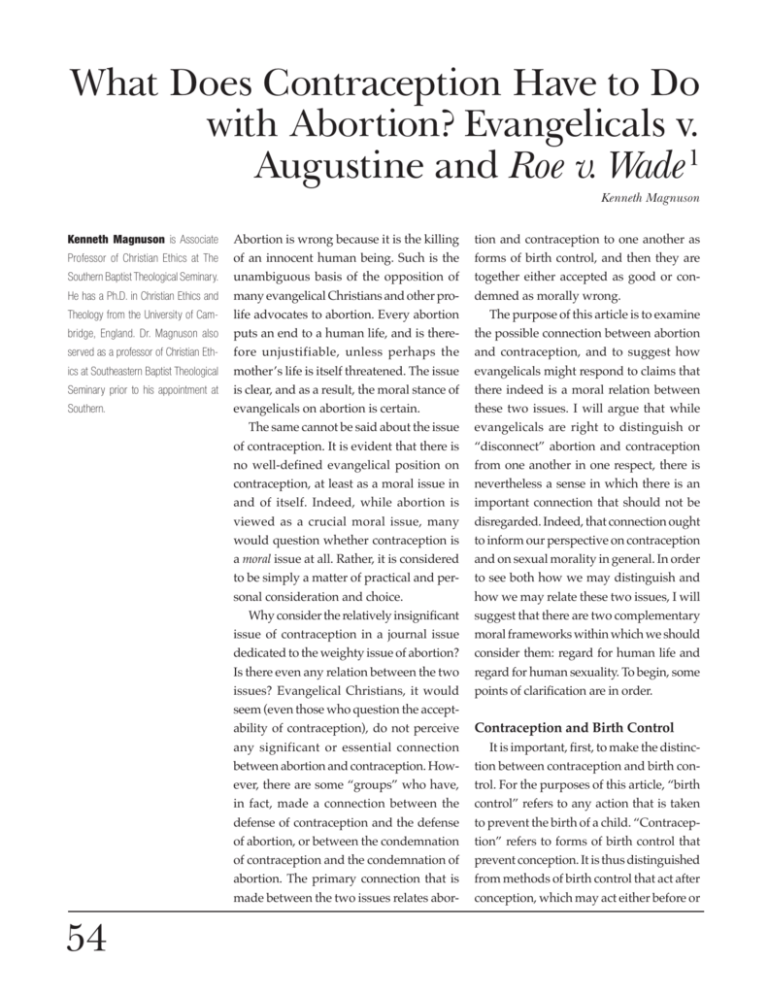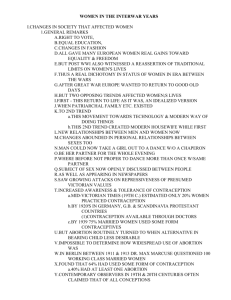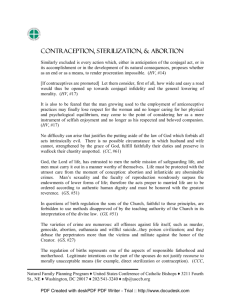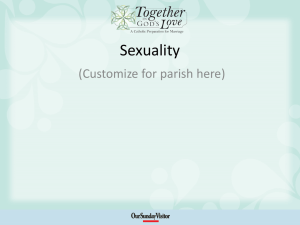
What Does Contraception Have to Do
with Abortion? Evangelicals v.
Augustine and Roe v. Wade1
Kenneth Magnuson
Kenneth Magnuson is Associate
Professor of Christian Ethics at The
Southern Baptist Theological Seminary.
He has a Ph.D. in Christian Ethics and
Theology from the University of Cambridge, England. Dr. Magnuson also
served as a professor of Christian Ethics at Southeastern Baptist Theological
Seminary prior to his appointment at
Southern.
54
Abortion is wrong because it is the killing
of an innocent human being. Such is the
unambiguous basis of the opposition of
many evangelical Christians and other prolife advocates to abortion. Every abortion
puts an end to a human life, and is therefore unjustifiable, unless perhaps the
mother’s life is itself threatened. The issue
is clear, and as a result, the moral stance of
evangelicals on abortion is certain.
The same cannot be said about the issue
of contraception. It is evident that there is
no well-defined evangelical position on
contraception, at least as a moral issue in
and of itself. Indeed, while abortion is
viewed as a crucial moral issue, many
would question whether contraception is
a moral issue at all. Rather, it is considered
to be simply a matter of practical and personal consideration and choice.
Why consider the relatively insignificant
issue of contraception in a journal issue
dedicated to the weighty issue of abortion?
Is there even any relation between the two
issues? Evangelical Christians, it would
seem (even those who question the acceptability of contraception), do not perceive
any significant or essential connection
between abortion and contraception. However, there are some “groups” who have,
in fact, made a connection between the
defense of contraception and the defense
of abortion, or between the condemnation
of contraception and the condemnation of
abortion. The primary connection that is
made between the two issues relates abor-
tion and contraception to one another as
forms of birth control, and then they are
together either accepted as good or condemned as morally wrong.
The purpose of this article is to examine
the possible connection between abortion
and contraception, and to suggest how
evangelicals might respond to claims that
there indeed is a moral relation between
these two issues. I will argue that while
evangelicals are right to distinguish or
“disconnect” abortion and contraception
from one another in one respect, there is
nevertheless a sense in which there is an
important connection that should not be
disregarded. Indeed, that connection ought
to inform our perspective on contraception
and on sexual morality in general. In order
to see both how we may distinguish and
how we may relate these two issues, I will
suggest that there are two complementary
moral frameworks within which we should
consider them: regard for human life and
regard for human sexuality. To begin, some
points of clarification are in order.
Contraception and Birth Control
It is important, first, to make the distinction between contraception and birth control. For the purposes of this article, “birth
control” refers to any action that is taken
to prevent the birth of a child. “Contraception” refers to forms of birth control that
prevent conception. It is thus distinguished
from methods of birth control that act after
conception, which may act either before or
after implantation, and which include
abortion.2
Although abortion has received a great
deal of attention from evangelicals, particularly since Roe v. Wade, there has not been a
great deal of discussion of contraception
and birth control in general, especially at a
scholarly level. There have been some contributions, mainly in books that deal with
various ethical issues, including texts such
as John Jefferson Davis’s Evangelical Ethics, Stanley Grenz’s Sexual Ethics,3 and John
and Paul Feinberg’s Ethics for a Brave New
World.4 These are helpful summaries of the
issues, but it remains true that there has
not been significant discussion within
evangelical scholarship. This is particularly
evident when compared with the interest
in contraception and birth control as moral
issues among Roman Catholic scholars, as
well as a more general debate that relates
birth control to population issues and
women’s rights and autonomy. For
instance, in a recent search of the database
of the American Theological Libraries
Association (ATLA), there were nearly 500
articles listed under “contraception” or
“birth control,” including 43 articles in the
journal Theological Studies. Yet there was not
one article on birth control or contraception
listed in the Journal of the Evangelical Theological Society.
It is not entirely clear whether evangelicals have an interest in these issues. For
instance, in the search of the ATLA database, Christianity Today had 26 articles listed
on birth control, the first appearing in 1966.
Yet, by comparison, there were 85 articles
found in The Christian Century. In addition,
in a Christianity Today survey, while 9 out
of 10 couples used some form of contraception, only 28% considered moral issues
when deciding what form to use.5 No
doubt even fewer considered moral issues
in deciding whether to use contraception
in the first place. It would appear that,
morally speaking at least, contraception
(and perhaps birth control in general) is a
non-issue for many. In a contribution to
First Things, James Nuechterlein suggests
why there is little discussion among Protestants. He writes:
It is not simply that the overwhelming majority of them come down on
the same side of the issue, but that
for most of them there is no real issue
here at all. [First Things] received a
flood of letters in response to the contraception symposium. Almost none
came from Protestants. This is not a
matter that engages them.6
If it is difficult to tell to what extent
evangelicals are interested in the issue, it
is not surprising that it is equally difficult
to determine an evangelical view of birth
control and contraception. We may have
some indication, however, from two treatments of the issues in Christianity Today, the
first from November 11, 1991, and the second from November 12, 2001. Here we may
observe that while the majority of evangelicals accept the use of some forms of
birth control within marriage, there are
some who believe that the use of any “artificial” birth control method is improper
even within marriage. The following is a
summary of some common arguments
used to defend or affirm the use of birth
control (or, more specifically, contraception) and those used to challenge the
acceptance of its use, several of which are
raised in the Christianity Today articles:
Defending the use of Birth Control
1. There is great latitude in moral
decision-making where there is no
clear command in Scripture, which
is the case concerning contraception
(and evangelicals remain unconvinced about Natural Law argu-
55
ments against contraception).
2. The purposes of marriage are more
than procreative. Indeed, unity, intimacy and pleasure are purposes of
marriage in their own right, which
may even be given some priority, and
which may be enhanced through the
use of contraception.
3. God has given us authority to order life and to be stewards of life
rather than simply to be driven by
nature. This includes the responsible
planning of the number and spacing
of children to facilitate things such as
education, companionship in marriage, the ability to care for existing
children, and so on.
4. Some suggest that couples could
forgo having children at all, e.g., in
cases where their service to God
might be increased by having no children.
5. Decisions about birth control ought
to be made with the goal of honoring God, not for selfish reasons.
Challenging the Acceptance
of Birth Control
1. Biblically, children are seen as a gift
and blessing, whereas the use of
artificial birth control often treats
children as a “risk” or liability, an
accident or inconvenience.
2. The focus on freeing up sex for
pleasure reflects our culture’s pursuit
of pleasure in freedom from responsibility, demonstrating a sense of selfishness.
3. Scripture commands us to be fruitful and multiply, and contraception
thwarts this command.
4. Obstructing the procreative purpose of marriage is either itself
claimed to be wrong, or wrong in that
such obstruction negatively affects
the purpose of unity and oneness in
marriage and thus marriage in general.
5.The commitment to marriage is also
a commitment to bearing and raising
children.
6. The acceptance of contraception
has not been very well thought out,
if considered at all.
These arguments do not each hold equal
weight, yet there are significant points
made on each side. It certainly indicates
that there is a place for debate and moral
56
reflection on the use of birth control.
Indeed, the issue may be of particular
interest because it tests and indicates something of our process of moral reasoning.
That is to say, if Scripture is not explicit or
absolute in what it has to say concerning
birth control, and I think that it is not, then
our thinking about this issue will indicate
how we might apply moral reasoning in
other areas that are not addressed explicitly or absolutely in Scripture.
Given some differences among evangelicals on the issue of birth control, we
may nevertheless make some general
observations. Evangelicals generally accept
the use of contraception in marriages that
are open to children, but are typically
opposed to forms of birth control that
prevent implantation, and are strongly
opposed to those that are clearly abortive.
Thus, a sharp distinction is made between
contraception and abortion as moral issues.
While contraception is often understood to
be morally neutral, abortion is judged to
be morally wrong. The moral criterion is
simple: it is the sanctity of human life.
Abortion involves the destruction of innocent human life, and therefore it is wrong.
Contraception does not destroy life, but
prevents its conception, and therefore it is
morally neutral, and may be used to aid in
responsible family planning.
While the criterion of the sanctity of
human life is clearly an important one, and
while it does distinguish abortion from
contraception as methods of birth control,
there are other issues that are worth thinking about when it comes to evaluating birth
control and specifically contraception. I
will turn to two quite different places to
raise those issues: Augustine (as a representative of some early Church Fathers) on
the one hand, and Roe v. Wade and those
who support liberal abortion laws (as rep-
resentatives of our contemporary culture)
on the other. Two general questions will
guide the following discussion. First, is
there a moral link between abortion and
contraception as forms of birth control?
Second, how does our answer to that question affect our understanding of birth control, contraception, abortion, and sexual
morality in general? The first question will
guide most of what follows, but the second question will be addressed by looking
at implications of our answer to the first.
The Morality of Birth Control:
The Evangelical Perspective and
its Dissenters
Evangelical Perspective(s)
As indicated already, evangelicals tend
to give a negative answer to the first question, concerning whether there is a moral
link between abortion and contraception.
The problem with abortion—that it is a violation of the sanctity of human life from
the moment of conception—is also a problem for other post-conception methods of
birth control. But that problem does not
present itself with forms of birth control
that prevent conception. Thus, while both
abortion and contraception may be considered to be methods of birth control, the
means to the end marks a great difference
between the two, and the means is the
decisive point in our moral evaluation. As
long as we do not violate the sanctity of
human life, and there are not other significant problems, it is believed that we can
use contraception responsibly within a
marriage that is open to children. It may
be added, however, that marriage ought at
least to be open to receiving children into
the relationship, even if contraception is
used. If it is not, surely it is a marriage that
is suffering from moral poverty.
Not all agree that a sharp line ought to
be drawn between abortion and contraception in a moral evaluation of birth control.
There are at least three significant types of
dissent from this view, which evangelicals
ought to reckon with in some way. Each
makes different assumptions about the
“ends” when making the moral judgment.
Roman Catholic Dissent
The first is the Roman Catholic view,
which I will simply note in passing,
because my interest at present is to look at
the connection made by the other dissenters. To summarize the Roman Catholic
view, it could be said that the above analysis is only partially correct. Abortion and
other methods of birth control that act after
conception are rightly condemned because
they violate the sanctity of human life. Yet,
such an analysis does not thereby permit
all remaining forms of contraception,
because Roman Catholic theologians typically also distinguish between “natural”
and “artificial” methods of birth control
that seek to prevent conception. Artificial
methods are condemned because of the
sanctity of marriage and the integrity of
sex. That is, anything that obstructs the
natural “ends” of the conjugal act is against
nature and is destructive of marriage and
sexual relations. Methods that do not
obstruct such ends, such as Natural Family Planning (NFP), are deemed acceptable.
Again, it is not my purpose to engage
with the Roman Catholic view here, but
only to note its dissent from the evangelical position that the primary or only moral
criterion for judging birth control methods
is the sanctity of human life. Nevertheless,
it is worth noting at least that many Protestants argue that this Roman Catholic
position wrongly takes an act-oriented
view of sexual relations within marriage.
A marriage as a whole may be open to the
57
blessing of procreation, preserving its
integrity, even if particular conjugal acts
seek to prevent conception.7 In addition, it
seems to many that such a view maintains
a strained distinction between “artificial”
and “natural,” since even NFP can hardly
be said to be truly natural. Finally, since
some type of limitation or family planning
is allowed, it may be asked whether intention is a more significant moral factor than
the Roman Catholic Church recognizes.
Augustinian Dissent
A second type of dissent from the general evangelical analysis of birth control
comes from the early Church Fathers, and
especially Augustine, whose views will be
the focus of this section. It may be said that
many of the early Christians saw a close
connection between contraception and
abortion as methods of birth control, and
condemned them together as aspects of the
same problem.8 This was true for several
reasons, including the fact that both were
seen as an assault upon human life and
because they obstructed the purposes of
marriage and sexual relations within marriage. In effect, Christians sought to distinguish their own beliefs and practices from
those of the culture around them. The following were some of the relevant issues in
relation to cultural beliefs and practices,
which affected Christian views (note that
aspects of these cultural issues are quite
relevant in our day as well):9
1. Both contraception and abortion
were used as forms of birth control
in order to limit family size, preserve
wealth, and cover up sexual immorality, including prostitution, fornication and adultery, etc. Such reasons
were contrary to Christian values and
beliefs.
2. It was unclear whether some drugs
acted as contraceptives or abortifacients, or both, and thus they were
58
to be avoided altogether.
3. The Gnostic and Manichaean belief
systems had an aversion to procreation as a form of material evil, in
contrast to the Christian affirmation
of procreation.
As an example, the Didache, an early
manual of Christian belief and practice,
condemns abortion alongside of sexual sins
as well as sins that attack human life:
You shall not kill. You shall not commit adultery. You shall not corrupt
boys. You shall not fornicate. You
shall not steal. You shall not make
magic. You shall not practice medicine (pharmakeia, probably meaning
drugs for sterilization or abortifacients). You shall not slay the child
by abortions (phthora). You shall not
kill what is generated. You shall not
desire your neighbor’s wife.10
As indicated, several early Church
Fathers also condemned birth control and
abortion (and infanticide), not only on the
basis of the sanctity of human life, but also
on the basis of the sanctity of marriage and
sexuality. Clement of Alexandria, for
instance, states, “what cause is there for the
exposure of a child? The man who did not
desire to beget children had no right to marry
at first; certainly not to have become,
through licentious indulgence, the murderer of his children.”11 The combination
of the desire for sexual indulgence and the
refusal to have children will lead people to
practice contraception, abortion, or even
infanticide. Jerome echoes the same sentiment when he says, “Some go so far as to
take potions, that they may insure barrenness, and thus murder human beings
almost before their conception. Some,
when they find themselves with child
through their sin, use drugs to procure
abortion.”12
Probably none of the early Fathers made
as sweeping a condemnation of birth con-
trol, including both contraception and
abortion, without distinction, as Augustine. In the following excerpt from “On
Marriage and Concupiscence,” we see
something of Augustine’s view of birth
control, which he connects with sexual lust:
Sometimes, indeed, this lustful
cruelty, or; if you please, cruel lust,
resorts to such extravagant methods
as to use poisonous drugs to secure
barrenness; or else, if unsuccessful in
this, to destroy the conceived seed by
some means previous to birth, preferring that its offspring should
rather perish than receive vitality; or
if it was advancing to life within the
womb, should be slain before it was
born. Well, if both parties alike are so
flagitious, they are not husband and
wife; and if such were their character from the beginning, they have not
come together by wedlock but by
debauchery. But if the two are not
alike in such sin, I boldly declare
either that the woman is, so to say,
the husband’s harlot; or the man the
wife’s adulterer.13
Augustine considers the attempt to prevent conception to be like the destruction
of the fetus in that sexual relations and
pleasure are sought apart from openness
to procreation. Such actions despise the gifts
of God and they are characterized and
condemned as “cruel lust.” For him, birth
control (contraceptive or otherwise) cannot
be justified even within marriage, for it desecrates marriage, turning it into something
that is simply used to satisfy human lust.
We may wonder about how abortion is
judged not merely on the basis of the sanctity of human life, but on the basis of sexual
morality and an inviolable connection
between sex and procreation. What are we
to make of Augustine’s account? It is common to dismiss him rather quickly, for various reasons. In part, this is because, as
Michael Gorman states, we “welcome the
church’s relatively recent liberation from
its negative, Augustinian attitudes towards
sex.”14 In addition, Augustine is dismissed
quickly because he claims that sexual relations must not only be limited to marriage,
but also always be directed at procreation,
if they are to be without fault.15 We who have
come to place priority on the companionship of husband and wife above other purposes of marriage find it difficult to grant
such a dominant place to procreation.
Furthermore, it is an alien concept to us
that Augustine could consider sexual relations within marriage, for the purpose of
pleasure, to be a sin, even a forgivable one.
Or, even more strange and appalling, that
married couples who would use contraception, so that they may enjoy marital love in
its own right, might be called harlots and
adulterers. Obviously, it is thought, Augustine has nothing to say to us in this regard.
His complete rejection of birth control and
his view that contraception and abortion
are points on the same continuum, are
mistaken and quite foreign to the contemporary mind. We are gladly liberated.
As a result, evangelicals, and Protestants
in general, largely reject Augustine’s views
on birth control and sexual morality. They
are also rejected by our contemporary culture, but for different reasons. Ironically,
even the Roman Catholic Church, whose
position on contraception has been built
largely upon the Augustinian analysis, has
departed from Augustine’s view. In particular, Augustine would not accept the
Roman Catholic affirmation of even “natural” methods of birth control, for in his
view, intentionally engaging in marital
relations only when conception is not
possible simply demonstrates a couple’s
servitude to lust. Despite this wholesale
rejection of Augustine, I believe that we
need to reckon with his analysis, in part
because he is sometimes misunderstood,
59
and in part because perhaps we have lost
something of his keen awareness of and
insight into our fallen sexuality.
In other words, while some of this criticism of Augustine is proper, other parts of
it are not, and we may be in need of some
Augustinian correction. For instance, it
is not quite right to say that Augustine has
a negative attitude towards sex. Rather, his
view is that sex (and even sexual desire),
as part of God’s creative purposes, may
be affirmed as good, but that fallen sexual
desire is hopelessly tainted by concupiscence or lust. It seems to me to be a difficult task to prove Augustine to be wrong
on this point, though we may respond
to the point differently than he does.
Augustine’s concern with birth control is
at least partly that sexual desire aimed at
pleasure as an end in itself either stems
from or leads to lust, to the extent that not
only is the attempt made to prevent conception, but, if necessary, to kill what is
conceived. Sexual pleasure is made to be
an idol. Such is “cruel lust,” in Augustine’s
words.
Before drawing some conclusions from
this analysis, I will turn to a third group
that could be considered “dissenters” from
the evangelical position that contraception
and abortion are not to be linked together
in our moral analysis. It is possible that we
may need to consider Augustine’s challenge more carefully, as we think about this
group of “cultural” dissenters in our day,
remembering that Augustine took aim, in
part, at the Greco-Roman culture of his day.
Indeed, our culture shares many values in
common with the Greco-Roman world.
Contemporary Cultural Dissent:
Roe v. Wade and Its Supporters
I will highlight Roe v. Wade and its supporters to indicate something at least about
60
the culture and morality of our day. And
what is the understanding of birth control,
and the relation, if any, between contraception and abortion in Roe v. Wade and among
its supporters? Roe v. Wade does not
directly address the relationship between
contraception and abortion. Neither does
it explicitly accept abortion as a means of
birth control. The Texas law, which allowed
abortion only to save the mother’s life, was
said to be too restrictive, and following on
that, all restrictive abortion laws were
struck down on the grounds of protecting
the mother’s life and health.16
However, there are clear indications that
this landmark ruling had more to do with
reproductive (and sexual) liberty than with
the mother’s health. First, because the case
against abortion was based in part on a
claim that Texas had violated the Due Process Clause of the Fourteenth Amendment.
Specifically, the clause says that states shall
not “deprive any person of life, liberty, or
property, without due process of law.” In
the case of abortion, it was interpreted that
women are deprived of liberty by restricting abortion, for if it was deprivation of life
that was at issue, then the Texas law (let
alone other less restrictive state laws)
would not need to be struck down. Second,
it is relevant that one of the key Supreme
Court decisions leading up to Roe was
Griswold v. Connecticut (1965), which was
appealed to in Roe. That case determined
that a married woman has the right to purchase contraception, based upon privacy
rights. Thus, its relevance to Roe is with
respect to privacy, not a woman’s health.
Finally, the fact that the Roe decision
stopped states from prohibiting abortions
for any reason during the first two trimesters of pregnancy clearly indicates that
abortion must be allowed as a means of
birth control. Otherwise, some limitations
would be considered, so that, for instance,
abortion could be prevented except in cases
of rape, incest, fetal deformity, or to protect the life of the mother, and so on.
Justice Blackmun, who delivered the
majority opinion in Roe v. Wade, makes his
view very clear in his dissenting opinion
in the case of Webster v. Reproductive Health
Services (1989), saying,
“Not with a bang, but a whimper,”
the plurality discards a landmark
case of the last generation [Roe v.
Wade], and casts into darkness the
hopes and visions of every woman
in this country who had come to
believe that the Constitution guaranteed her the right to exercise some
control over her unique ability to bear
children. The plurality does so either
oblivious or insensitive to the fact that
millions of women, and their families, have ordered their lives around
the right to reproductive choice, and this
right has become vital to the full participation of women in the economic
and political walks of American life.17
The use of abortion as a means of birth control can be seen further in some arguments
defending abortion and the Roe v. Wade
decision. For instance, Virginia Ramey
Mollenkott states:
How is a married woman able to plan
schooling or commit herself to a
career or vocation as long as her life
is continually open to the disruption
of unplanned pregnancies? Unless, of
course, she can fall back on an abortion when all else has failed.18
Likewise, Laurence Tribe says:
Laws restricting abortion so dramatically shape the lives of women, and
only of women, that their denial of
equality hardly needs detailed elaboration. While men retain the right to
sexual and reproductive autonomy,
restrictions on abortion deny that
autonomy to women. Laws restricting access to abortion thereby place
a real and substantial burden on
women’s ability to participate in
society as equals.19
The end result of Roe v. Wade, and the
expectation of many of our cultural arbiters, is that abortion must be available as
a means of birth control, should contraception not be used or should it fail. Some
deny that they support such a view, but
their logic and ultimate position demonstrates the point, or there would be no
objection to legal provisions that would
limit reasons for abortion. And, indeed, if,
as it is claimed, the human life in the womb
is not one that is worthy of legal protection, then how could someone object to a
particular reason for which abortion is
used?
In a recent book, Daniel Maguire displays the inconsistency of many arguments
used to defend abortion. It is suggestive
that the book examines the right to contraception and abortion in religious traditions
(and in a claim that defies understanding—and reality—Maguire argues that
views opposed to abortion and those
defending it are both legitimate and
authentic views within each tradition). At
one point, Maguire states that “the religious scholars you will meet in these pages
are at one with the position stated by Asoka
Bandarage: ‘Abortion should not be used
as a contraceptive method, but safe and
legal abortions should be available to
women who choose to have them.’”20 Yet
later he cites Christine Gudorf without
challenge when she says that in earlier days
“abortion was not the ‘birth limitation of
choice because it was, until well into the
twentieth century, so extremely dangerous
to the mother.’”21 Abortion is defended in
part, at least, as a method of birth control,
whatever may be said to the contrary.
Finally, it can be added that, in practice,
61
abortion is widely used as a method of
birth control in our culture. It is significant
to note a study by the Alan Guttmacher
Institute (USA 1987-88), the research arm
of Planned Parenthood. The study asked
women who had abortions what their main
reason was for the abortion. Their answers
are revealing, with at least 92% giving
reasons that indicated that abortion was
used as a means of birth control.22
It is fair to say that abortion is considered to be a method of birth control. Such
a view was implied in the arguments in Roe
v. Wade and other legal rulings. It is also
maintained in various arguments made in
defense of abortion, and is seen in the
actual reasons given for having abortions.
It is, in other words, a commonly held view
that abortion is linked with contraception
as forms of birth control, and both are
defended as morally acceptable.
Conclusions and Implications
To summarize the main ideas to this
point, we may say that evangelical Christians, for the most part, do not consider
contraception and abortion to be linked
together morally as forms of birth control,
but to be significantly different issues.
Based upon the sanctity of human life,
abortion is judged to be wrong, while
contraception is said to be morally neutral.
Augustine challenges this point of view. He
maintains that abortion and contraception
are of the same species. Based upon the
sanctity of marriage and sexuality, he condemns both abortion and contraception as
morally wrong, because they fuel lust, and
marriage is used as a cover-up to such
immorality and to give an appearance of
decency. Augustine’s view was a response
in part to the prevailing views of his day,
which also held that contraception and
abortion were, in effect, continuous moral
62
issues, but which had gained acceptance
among many in the Greco-Roman world.
Interestingly, the prevailing evangelical
view exists in a day when the surrounding culture holds a view similar to the
Greco-Roman culture. The judgment of Roe
v. Wade and its supporters agree that abortion and contraception are of the same
species in some sense. And, based upon
autonomy, including the right to sexual
and reproductive freedom, and the “good”
of limiting family size, they defend both
abortion and contraception as morally
acceptable.
In other words, though their conclusions
are clearly different, there is at least one
relevant point upon which Augustine
agrees with the culture of his day and with
Roe v. Wade and its supporters: They agree
that abortion and contraception free sex
from its “essential” connection to procreation. As forms of birth control, both abortion and contraception allow for freedom
from procreation and freedom for sexual
indulgence (inside and outside of marriage). The Greco-Roman culture and Roe
v. Wade and its supporters defend both
methods morally because they allow for
freedom and moral responsibility. Augustine condemns both methods as an attack
upon marriage and sexuality, allowing for
the free reign of lust.
What conclusions might be drawn from
this study? Do we reject the Augustinian
analysis of the issues as readily as we reject
our culture’s view that contraception and
birth control are linked together in morally
significant ways? How is it that such vastly
different perspectives as Augustine and
Planned Parenthood agree on anything
with respect to birth control? I would suggest that Augustine’s analysis might provide us with some important insight, and
in doing so, we might rescue something
of his perspective from those who would
quickly dismiss him. Or, perhaps Augustine might rescue us from our own
unchecked attitudes concerning marriage,
contraception, and sexual morality in
general.
If nothing else, hopefully the challenge
of Augustine is one that will invite us to
think more critically about the issue of contraception. The following are some considerations for evangelical reflection on the
use of contraception.
First, we need to articulate a perspective that is distinguished from our culture
in significant ways. This has been accomplished, in part, through the focus on the
sanctity of human life as a crucial moral
criterion. Yet, from Augustine (and negatively from our culture), we can learn something important about the broader issue
that he addressed. That is to say, another
criterion by which we may evaluate both
abortion and contraception is (something
like) the sanctity of sexuality and marriage.
If we use this criterion, we may at least
attend to some of Augustine’s concerns.
Our culture defends and practices abortion
as a form of birth control, demonstrating
the lengths to which we will go for reproductive or sexual “freedom.” There is
evidence that evangelicals, too, have been
significantly affected by this ethic of sexuality, and that Augustine was not far off
the mark:
1. The CT study cited earlier indicates
that Christians do not even consider
moral issues with regard to procreation and contraception.
2. Evangelicals were slow to realize
the devastation of liberalized abortion laws (and, indeed, many actually supported them prior to Roe v.
Wade), and it may well be that we
have not fully comprehended the
effects of the sexual revolution in general.
3. In addition, according to an Alan
Guttmacher Institute survey on abortion, 1 in 5 women having abortions
identified themselves as “born again”
or “evangelical” (which, if accurate,
amounts to 250,000 or more abortions
each year).23
Second, we need to articulate a perspective that is distinguished from Augustine
in some ways. Resisting our culture’s perspective on contraception does not require
rejecting the use of contraception altogether. Augustine’s wholesale rejection of
all forms of birth control (besides abstinence!) notwithstanding, we may say that
the distinction between contraceptive and
abortifacient methods (including surgical
abortion) is valid, and the sanctity of
human life is an important criterion by
which to evaluate both abortion and other
birth control methods. This criterion clearly
points to a decisive difference in means.
Birth control methods that act after conception (including abortion) are properly
judged to be morally wrong on this criterion, while methods that prevent contraception may be acceptable in a marriage
that is open to children, so long as they do
not do harm in other ways.
Third, we need to cultivate moral wisdom concerning the responsible use of
contraception because contraception in itself
is morally neutral. One of the reasons that
many evangelicals do not speak more
frequently or clearly on the issue of contraception is because we do not have a
clear Biblical imperative to which we may
appeal. Nor is there confidence in a principle derived from Natural Law (or a particular interpretation of Natural Law). In
such cases, it is often implied that there are
no moral issues, only pragmatic ones. The
“bottom line” for many, then, is that moral
wisdom may be nice, but if there is not a
clear right and wrong, it hardly seems to
63
be worth a large investment of time simply to give advice. We need to resist such
notions, and recognize the importance of
wisdom if we are to use our freedom
responsibly. Thus, it is not only possible,
but also necessary to reflect and deliberate
morally about contraception.
The following points represent some
areas of concern that are deserving of our
attention and further discussion. First, we
may affirm that contraception can be a
blessing, but, if so, it is a mixed one. We
might note that, on balance, the benefits
that we have achieved with reliable birth
control methods have come with a price.
Many consider child spacing and limitation to be a blessing, but can that blessing
be embraced apart from some recognition
of the tragic results that have accompanied
the sexual morality that has grown up with
effective birth control? Is it possible for
Christians to distinguish ourselves from
our culture in our use of birth control? If
not, perhaps there is a deeper problem than
we recognize. But if so, then we need to
describe how it is possible.
Second, we may recognize that there is
a balance in the “goods” of marriage.
Through much of church history, procreation was seen as the primary purpose of
both sexual relations and marriage, and
this was especially so for Augustine and
other church fathers. Against the
Manichees, who disparaged marriage and
procreation, Augustine spoke of the goods
of marriage, among which procreation was
central, which led him to reject both abortion and contraception.24 If we consider not
only the sanctity of human life, but also a
broad concern for sexual morality, as a
mode of ethical reflection, we may be cautious about attitudes and behaviors that
radically separate marital union and procreation.
64
Third, we ought to show clearly that we
welcome children into our marriages. We
ought to be careful to avoid a contraceptive mentality, in which children are simply seen as choices, which, if not planned,
may be an intrusion into our plans, hopes,
and dreams. In a culture that sees children
as risks and in which the importance of
children is diminishing, Christians ought
to affirm the blessing of children. A recent
report in the National Marriage Project, sponsored by Rutgers University, concludes that
there has been a loss of child centeredness
in our culture. It states:
The presence of children in America
has declined significantly since 1960,
as measured by fertility rates and the
percentage of households with children. Other indicators suggest that
this decline has reduced the child
centeredness of our nation and
contributed to the weakening of the
institution of marriage.25
Is it possible that Christians can use birth
control responsibly while at the same time
affirming the central place that belongs to
children in marriage (and that ties sexual
intercourse to procreation)? Can we be
intentional about doing so?
Fourth, we ought to be particularly cautious about sterilization. The fact that more
than 38% of all users of birth control choose
sterilization as the preferred method (making it the most common form of contraception) suggests a fairly radical loosening of
the bond connecting sexual union and procreation.26 There may not be clear moral
lines here, but moral wisdom suggests not
severing too quickly or permanently the
connection between sexual union and
procreation. If, as Protestants are fond of
saying, the totality of our unions are to be
open to procreation, what is the significance of ending that possibility, especially
simply because we have the number of
children that we want?
Fifth, pleasure should be kept in perspective. If one of the problems that has
marked some teaching on marriage and
sexuality in the past has been a suspicion
of sexual desire and pleasure, that is surely
not our problem. Instead, while we deny
our culture’s view that any and all forms
of sexual desire are perfectly good, we do
tend to think that sexual desire within
marriage is by definition without fault.
Furthermore, we tend to elevate pleasure
to a central place in our understanding of
sexual relations within marriage. Perhaps
we ought to recognize, as Augustine did,
that pleasure, for which contraception frees
up sexual relations, can easily become
idolatrous, and that even in marriage lust
can be a problem. We ought to distinguish
ourselves from our culture in terms of our
understanding of sexuality and marriage,
and not promote a view of sex for pleasure
apart from the broader purposes of marriage. “Intended for pleasure” ought not
to be our only or even primary understanding of sex. As NFP advocates Sam and
Bethany Torode recognize, true pleasure
may be something much more than a
momentary and intense feeling, if we place
it in proper perspective and pursue greater
things.27 Pleasure has its place, and it is a
good gift of God. Yet, perhaps rather than
being a purpose of sexual relations in itself,
it may simply be given by God so that we
might receive great joy in pursuing the
deeper purposes of marriage, including
unity and procreation. What an incredible
blessing that, as we give ourselves to our
spouse, we also receive pleasure, all the
while welcoming the possibility of transmitting the gift of life.
Finally, we may recognize that while
nature need not be our master, it can be a
guide. Natural Law arguments have often
led to the conclusion that contraception is
morally wrong, because it goes against
nature (in part, by obstructing the natural
“ends” of sexual relations in marriage). If
we are right in claiming that contraception
need not be seen as a problem in and of
itself, it is in part because we find fault with
this reasoning. We may claim that another
“end” of marriage is unity, for instance,
which is not obstructed (necessarily) by the
use of contraception. Or, we may claim that
we have been given dominion over nature.
Yet nature may still serve as a guide,
disclosing to us, perhaps, the natural connection between unity and procreation in
marriage and sexual relations. This disclosure comes through reflection not only on
the natural connection, however, but also
through Scripture’s attestation to the purposes of marriage and the creation of male
and female. As a result, we are encouraged
not to think that the only thing that ties
marriage and sexual relations to procreation is the human will and choice. If we
wish to avoid inadvertently supporting a
radical separation of marriage, sex, and
childbearing, then we do well to reflect
upon the natural connection that is given
and blessed by God. For if the only thing
that ties marriage and sex to procreation is
the human will, then what will be thought
to be artificial is not the use of contraception, but the supposed connection (once
thought of as natural) between sex and
procreation. Inevitably, such a view will
lead not only to the unreflective use of contraception, but also, by contributing to the
severing of sex from procreation, it may
unwittingly contribute to our culture’s
acceptance of abortion.
ENDNOTES
An earlier version of this article was presented as a paper at the annual meeting
1
65
of the Evangelical Theological Society in Toronto, Ontario, Canada, in
November, 2002 entitled “Abortion,
Birth Control and Sexual Morality:
Augustine, Roe v. Wade and
NARAL.”
2
Conception is understood here as the
point at which fertilization occurs,
though some hold that conception is
the point at which implantation
occurs. For a discussion of the various forms of birth control and ethical implications, see William Cutrer,
Family Building: Fact, Fallacy and
Faith, A Christian Doctor Looks at Contraception (Dallas: Aspire, 2002); cf
John Jefferson Davis, Evangelical Ethics: Issues Facing the Church Today, 2nd
ed. (Phillipsburg, NJ: P&R, 1993) 1830. In some cases, such as the birth
control pill (or oral contraceptives),
there is debate concerning whether
they always act prior to conception.
For a summary of this issue, see
Cutrer, Family Building; also Walter
Larimore and Randy Alcorn, “Using
the Birth Control Pill is Ethically Unacceptable,” in The Reproduction
Revolution, ed. John F. Kilner, Paige
C. Cunningham, and W. David
Hager (Grand Rapids: Eerdmans,
2000).
3
Stanley J. Grenz, Sexual Ethics: An
Evangelical Perspective (Louisville,
KY: Westminster John Knox, 1990).
4
John S. and Paul D. Feinberg, Ethics
for a Brave New World (Wheaton, IL:
Crossway, 1993).
5
George K. Brushaber, “The Joy of
Procreation,” Christianity Today, 11
Nov 1991, 45.
6
James Nuechterlein, “Catholics, Protestants, and Contraception,” First
Things 92 (April 1999) 10.
66
For a helpful discussion of the
Roman Catholic view(s) of contraception, by both Protestant and
Roman Catholic scholars, see “Contraception: A Symposium,” First
Things 88 (December 1998) 17-29. For
a thorough study of the historical
and theological issues from a Roman
Catholic perspective, see John T.
Noonan, Jr., Contraception: A History
of Its Treatment by the Catholic Theologians and Canonists, enlarged ed.
(Cambridge, MA: Harvard University Press, 1986).
8
For example, Didache 2.2; Hippolytus, The Refutation of all Heresies 9.7;
Jerome, To Eustochium 22.13; Justin
Martyr, First Apology XXIX; Clement
of Alexandria, The Stromata Book II,
ch. XVIII.
9
I have adapted this list from John T.
Noonan, Jr., “Contraception,” in The
Westminster Dictionary of Christian
Ethics, ed. James Childress and John
Macquarrie (Philadelphia: Westminster, 1986) 124-125.
10
Didache 2.2. The prohibitions here
are connected, as each sin is a sexual
sin and/or a sin against human life.
11
Clement of Alexandria, The Stromata,
Book II ch. XVIII. Italics added.
12
Jerome, To Eustochium 22.13.
13
Augustine, On Marriage and Concupiscence 1.17.
14
Michael J. Gorman, “The Church’s
Changing Mind,” Christianity Today,
11 November 1991, 43.
15
See, for example, Augustine, On the
Good of Marriage, 6.
16
For an examination of Roe v. Wade
and an analysis of the abortion controversy in general, from various
perspectives, see Louis P. Pojman
and Francis J. Beckwith, The Abortion
7
Controversy: 25 Years After Roe v.
Wade: A Reader, 2nd ed. (New York:
Wadsworth, 1998).
17
Cited in May it Please the Court: Arguments on Abortion, ed. Stephanie
Guitton and Peter Irons (New York:
The New Press, 1995) 122. Italics
added. For a complete transcript, see
http://caselaw.lp.findlaw.com/
scripts/getcase.pl?navby=case&
court=US&vol=492&page=490.
18
Virginia Ramey Mollenkott, “Reproductive Choice: Basic to Justice for
Women,” Christian Scholar’s Review
17 (March 1988) 289.
19
Laurence Tribe, Abortion: The Clash of
Absolutes (New York: Norton, 1990)
105. Italics added.
20
Daniel C. Maguire, Sacred Choices:
The Right to Contraception and Abortion in Ten World Religions (Minneapolis: Fortress, 2001) 27.
21
Ibid, 38. Italics added.
22
http://www.guttmacher.org/pubs/
journals/2411798.html; the reasons
given were as follows:
25.5% Wants to postpone
childbearing
7.9% Wants no (more) children
21.3% Cannot afford baby
10.8% Child would disrupt
education or job
14.1% Relationship problem or
partner does not want baby
12.2% Too young to have baby
2.8% Risk to maternal health
3.3% Risk to fetal health
2.1% Other reasons
Note: all but the last three (or 8.2%)
are forms of birth control, and some
of the last three may be as well.
23
http://www.guttmacher.org/pubs/
archives/prabort2.html.
24
Cf. Noonan, 124.
Barbara Dafoe Whitehead and David
Popenoe, “The State of Our Unions:
The Social Health of Marriage in
America,” The National Marriage
Project, 2002 (http://marriage.
rutgers.edu/TEXTSOOU2002.htm)
26
http://www.agi-usa.org/pubs/
fb_contr_use.html.
27
Sam and Bethany Torode, “Make
Love and Babies,” Christianity Today,
12 November 2001, 48-54.
25
67








